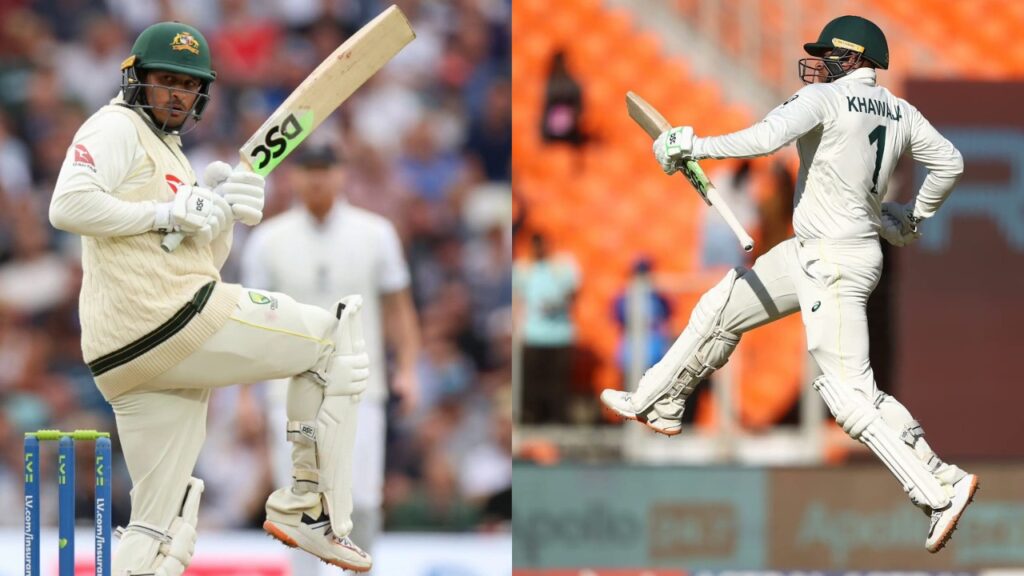Caption: Usman Khawaja has been in the eye of a storm over his views on Palestine. (Source X)
At the pre-match press conference ahead of the Perth Test against Pakistan, Pat Cummins, Australia’s captain, left little room for doubt as to where his sympathies lay. “I think it is one of our strongest points as a team that everyone has their own passionate views and individual thoughts,” he said. “I chatted to Uzzy briefly about it today, and yeah, I don’t think his intention is to make too much of a fuss, but we support him.
“[The ICC] drew attention to the rules, which I don’t know if Uzzy was aware of beforehand. Uzzy doesn’t want to make too big a fuss. On his shoes, he had ‘all lives are equal’ [written with marker pen]. I think that’s not very divisive. I don’t think anyone could really have too many complaints about that.”
As it turned out, there were plenty of complaints, the most vocal one coming from Simon O’Donnell, who played for Australia in the 1980s. “I fully respect Usman Khawaja’s beliefs personally … he should be able to state his beliefs on his own platform,” he told the SEN radio station. “But while he’s representing Australia, he has no right, nil, zero, to bring his personal beliefs and instill those onto others.”
Therein lies the crux of the issue. Where does a sports team or organisation draw the line between the personal and the political? If players can wear black armbands because a head of state or somebody’s grandmother passed away, what’s to prevent another athlete drawing attention to an issue that’s as dear to his or her heart?
Imagine a scenario where England had been playing India when Queen Elizabeth II passed away. England’s players would have been well within their rights to wear black armbands as a gesture of mourning. Equally, Indians would have been justified in viewing that as a political statement. After all, the British Empire was responsible for millions of Indian deaths. In the case of Bengal, where RevSportz is based, there aren’t even accurate numbers for how many lost their lives in the famine in the 1940s, on account of Britain’s callousness.
Khawaja, who has been a vocal critic of Israel’s actions in Gaza on his social media platforms in recent weeks, will doubtless recall what happened with Moeen Ali nearly a decade ago. During the third Test against India in Southampton in 2014, Moeen had worn ‘Save Gaza’ and ‘Free Palestine’ wristbands. The England and Wales Cricket Board (ECB) had cleared them because they saw it as a humanitarian statement rather than a political one.
They were also likely aware that they risked being accused of hypocrisy if they stopped Moeen. After all, the entire team had the ‘Help for Heroes’ badge on their shirts in commemoration of 100 years having passed since the outbreak of WW I. But what the ECB considered alright was not acceptable for the ICC.
Also Read: Manchester United have Become Football’s Black Hole
David Boon, the match referee, stepped in and there was an ICC statement that read: “The ICC equipment and clothing regulations do not permit the display of messages that relate to political, religious or racial activities or causes during an international match. Moeen Ali was told by the match referee that while he is free to express his views on such causes away from the cricket field, he is not permitted to wear the wristbands on the field of play and warned not to wear the bands again during an international match.”
Khawaja is not the only cricketer to be at the centre of a storm as a result of the conflict in the Middle East. David Teeger will almost certainly lead South Africa on home soil during the Under-19 World Cup, after hosting rights were taken away from Sri Lanka. At a recent event for the Jewish community, where he was presented with the Rising Star Award, the 18-year-old Teeger said: “Yes, I’ve been (given) this award, and, yes, I’m now the Rising Star, but the true rising stars are the young soldiers in Israel.”
His comments led to complaints from the Palestine Solidarity Alliance, who were dismayed by his “unequivocal support” for the Israel Defence Forces (IDF), which in turn led to a Cricket South Africa (CSA) enquiry. That eventually cleared Teeger on free-speech grounds, but with both sides taking up strident positions, Teeger could be the target of protests when he takes the field in January 2024.
The Black Power Salute by Tommie Smith and John Carlos, on the Olympic podium after the men’s 200m in Mexico City in 1968, remains one of the most iconic images from sport and popular culture in the 20th century. The story of how Muhammad Ali threw his Olympic gold into the Ohio river – and later missed out on prime years of his career after refusing to be drafted into the army to fight in Vietnam – is part of textbooks across the globe.
As a microcosm of life, sports reflects the society and culture that it’s part of. To expect it, and the athletes who perform, to stay divorced from the politics of the day is wishful thinking, not to mention terribly naïve. Even if he doesn’t wear those special shoes at the Optus Stadium, Khawaja has already made his point.
For more sports news click here




